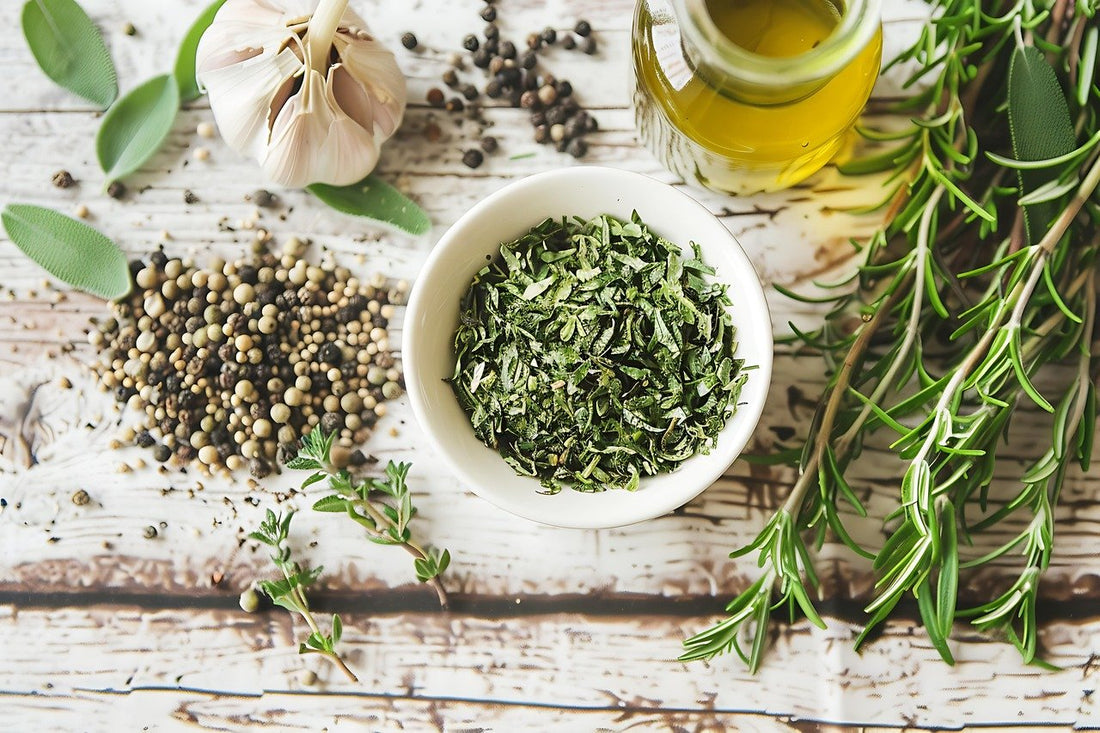
Why You Should Reach for Herbs: History, Evidence, and Health Benefits
Share
Why You Should Reach for Herbs: History, Evidence, and Health Benefits
Herbs have been an integral part of traditional medicine for centuries, used for both preventive care and the treatment of various ailments. Since ancient times, civilisations such as the Egyptians, Greeks, and Chinese recognised the remarkable power of plants, incorporating them into daily life to promote health, improve well-being, and cure diseases. Today, modern scientific research confirms what was once known through tradition: herbs are a treasure trove of bioactive compounds that can have a significant impact on our health. In this article, we explore why it’s worth incorporating herbs into your daily routine, backed by historical context and scientific evidence.
The History of Herbs in Medicine
Herbs have been used in natural medicine for millennia. Hippocrates, the Greek father of medicine, famously said, "Let food be thy medicine, and medicine be thy food". In his philosophy, herbs played a central role in maintaining health. Similarly, in traditional Chinese and Ayurvedic medicine, herbs were fundamental to therapies, with their use closely linked to restoring balance in the body and mind.
Herbs like elderberry, echinacea, chamomile, and ginger have been used for centuries to treat colds, support digestion, alleviate symptoms of the flu, and calm stress and anxiety. Their popularity remains strong today, and in many cultures, they still form a vital part of home remedies.
Scientific Evidence Supporting the Effectiveness of Herbs
Contemporary science has proven the efficacy of many herbs that have been in use for generations. Clinical and laboratory studies have shown that herbs contain valuable active compounds, such as flavonoids, alkaloids, terpenes, tannins, and glycosides, which possess anti-inflammatory, antibacterial, antiviral, and immune-boosting properties.
-
Elderberry (Sambucus nigra) is one of the most well-documented herbs for colds and flu. Studies have shown that elderberry extracts can help speed up recovery, reduce the severity of flu symptoms, and shorten the duration of illness.
-
Echinacea (Echinacea purpurea) has been extensively researched for its impact on the immune system. Numerous studies suggest that regular use of echinacea can help prevent upper respiratory infections, particularly during flu season.
-
Ginger (Zingiber officinale) is another herb with potent anti-inflammatory and pain-relieving properties. Research has shown that ginger can alleviate the symptoms of osteoarthritis, improve digestion, and boost the immune system.
Health Benefits of Herbs
Herbs are a rich source of beneficial compounds that can support health in various ways. Here are some of the main health benefits of incorporating herbs into your routine:
1. Supporting the Immune System
Herbs such as elderberry, echinacea, ginger, and garlic help strengthen the immune system, assisting the body in fighting off infections. These herbs are known for their anti-inflammatory and antibacterial properties, making them effective at combating colds, flu, and other viral infections.
2. Improving Digestion and Detoxification
Plants like peppermint, nettle, chamomile, and dandelion support the digestive process, improve gut motility, and help detoxify the body. Regular use of these herbs can improve digestive comfort and aid in cleansing the body of toxins.
3. Reducing Stress and Improving Well-Being
Herbs such as lavender, lemon balm, passionflower, and wild rose have calming and anti-anxiety properties. Consuming these herbs in the form of teas or infusions can help reduce stress, improve sleep quality, and enhance overall well-being.
4. Antioxidant Properties
Herbs like green tea, turmeric, and black pepper contain strong antioxidants that help combat free radicals, slow down the ageing process, and protect the body from chronic diseases, including cancer.
How to Incorporate Herbs into Your Daily Diet
The best way to enjoy the health benefits of herbs is by incorporating them into your daily routine. You can consume them in the form of teas, infusions, extracts, and even as ingredients in your meals. Herbal teas, such as chamomile tea, elderberry tea, or peppermint tea, are an excellent way to unwind after a long day. You can also reach for herbal syrups or oxymels, which are fantastic for boosting immunity.
Herbs: A Natural Apothecary in Your Home
Herbs are an extraordinary gift from nature that can support your health and assist in your daily wellness routine. With growing awareness of their properties and scientific evidence confirming their efficacy, more and more people are turning to herbs as a natural alternative to pharmaceutical treatments. Incorporating herbs into your diet is an excellent way to harness their beneficial effects on your health.
